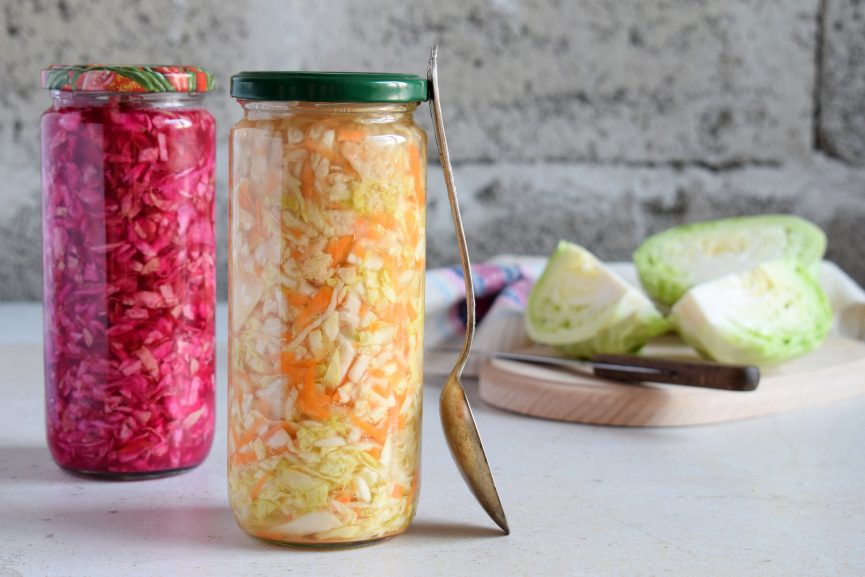Fermented Foods
Treading more lightly is supported by harnessing the power of bacteria and fungi to enhance the nutrition of foods. This is the ancient practice of fermentation. Fruit vinegar, kombucha and sauerkraut are easy ferments that everyone could make. They are a common starting point for many people’s exploration of traditional foods and reconnection with the cycles of life.
Apple Vinegar
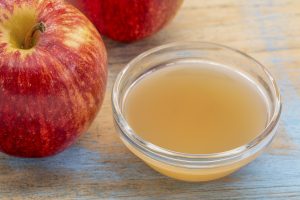
Image: red apples with a tiny dish of apple vinegar
This almost magical liquid has been used by humans for millennia for many purposes wherever apples grow. Hippocrates was using apple cider vinegar to heal ailments as long ago as 400BC.
We’re lucky in Banyule to have an apple-friendly climate and some nearby orchards. If you or your neighbours don’t have a productive apple tree to share, you can source local apples to make your own delicious vinegar from Petty’s orchard or local farmers’ markets. Local apple cider vinegar is also produced by numerous apple orchards on the urban fringe and elsewhere in Victoria.
We use it for cleaning household surfaces, internally and externally to support health, and in preserving other foods. It’s one of the kitchen staples that is a foundation of our healthy household.
See also Apples
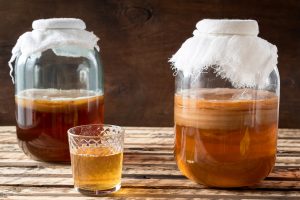
Image: 2 large jars of fermenting kombucha with a glass of the finished drink
Kombucha
Increasingly available at local cafes and supermarkets, this immensely popular fermented drink is easy to make at home. Ask at local food swaps for a ‘SCOBY’ – the rubbery disc produced by the organism on the surface of the fermenting liquid, repurpose a big pickle jar, mix up a batch of sugary tea (see recipes in a library book for proportions) and you’re on your way to creating your own delicious, healthful, naturally carbonated drinks that can replace bought beverages for everyday consumption and celebrations. From here, you might like to explore other fermented drinks, or not; there’s a reason so many people love kombucha.
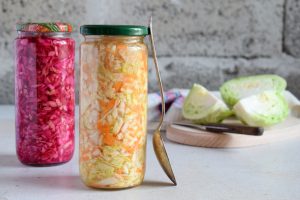
Image: two tall jars of sauerkraut with a cut cabbage in the background
Sauerkraut
Fermenting vegetables is easy. Sauerkraut could be the easiest!
Local Food
An edible garden on an 800m2 block in Heidelberg produces more than 700kg of fresh food every year. The people who live there rarely need to go food shopping and have an abundance to share with visitors. Even a balcony garden can produce significant quantities of food, as shown by Indira Naidoo’s story The Balcony Garden. If you don’t grow much, you can source local food from farmers’ markets in Alphington, Bundoora and Eltham, or independent greengrocers in many of our suburbs. Local Food Connect is the community organisation working to rebuild local food systems in Banyule and Nillumbik. They run the Eltham Farmers’ Market and many other valuable food projects.
Local food is a cornerstone of sustainability, and sharing – our knowledge, access to land and homegrown food – is an essential element of treading lightly together. Have you embraced local food, adjusting your diet to follow the seasons, trying less common varieties of edible plants and simplifying your routines to accommodate more cooking from scratch? Every step can make a big difference.
See also Cooking from Scratch, Edible Gardens and Nature Strips
Flowers
“Flowers are underrated”, said a local community garden member a couple of years ago. And so, daffodils*, cosmos and calendula were planted around lots of the garden plots, bringing cheer to the gardeners, passers-by, and beneficial insects.
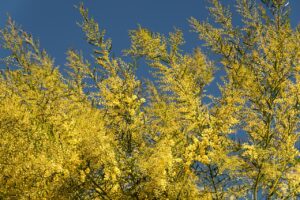
Image: sprays of yellow wattle flowers against a deep blue sky
Planting the gift of flowers provides food year round for our local fauna, particularly native bees. Look at local native gardens and nurseries for inspiration about what to plant or check out Banyule Gardens for Wildlife (fb group) for more info. Katrina at Buzz and Dig teaches community workshops about providing for local native bees.
The world needs more flowers. We can begin with Banyule.
*take care to avoid mixing up daffodil bulbs, which are toxic, with your edible bulbs!

